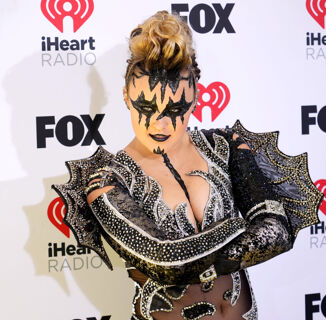One of this year’s finest queer characters happens to also be one of the most slept-on. This is often the fate of queer characters who find themselves in not-queer movies, or at least movies that aren’t marketed as queer. But Cord Jefferson’s debut American Fiction doesn’t have to be about queerness to get a few things exactly right about queer life.
Related:
In Fiction, This is Us and Biosphere actor Sterling K. Brown lends his formidable talents to the character of Cliff Ellison, the brother of Thelonious “Monk” Ellison, a Black writer feeling constrained by the current publishing climate. Although Fiction is based on Percival Everett’s 2001 novel Erasure, itself a reaction to the late 90s/early oughts publishers’ insistence on one-dimensional Black stories, the market hasn’t changed much in that time, and Monk’s problems feel as modern as ever. He finds himself in a rough position at the story’s start: he’s written a book along similar lines of his last few novels, which deal with Greek myth and are considered “not Black enough” by white publishers hungry for stereotypical fare. So he writes a fake novel and invents a fake persona to go with it, a spur-of-the-moment decision that ends up having bizarre and life-changing consequences for the academic.

Culture, unfiltered
Twice a week, our newsletter will bring you the pulse of queer culture, from the tastemakers to the groundbreakers.
But that’s only part of what American Fiction is about. Most of the film deals with Monk’s homecoming. He returns to his home city of Boston after being put on (unpaid) leave at the university where he teaches. After opting out of the family drama for years, he comes back to find everything much the same, only slightly more chaotic than he could have expected. His mother is dealing with the early stages of Alzheimer’s, and his sister Lisa (Tracee Ellis-Ross) is burnt out as her caretaker. Before Monk has any time to adjust, his sister dies, and he’s left with the task of caring for the mother he hasn’t seen in years.
Into the mix comes Cliff, Monk’s gay, plastic surgeon brother who’s dealing with his own avoidance issues. Cliff, too, lives far away from Dorchester, and hasn’t been in any real hurry to come back. At Lisa’s funeral, the brothers have their first real conversation in a long time: Cliff explains that his marriage broke up because he came out as queer, and that his ex-wife has been using that fact to keep him from his kids. He’s also “taken a lover” or two, as well as a coke habit, and he’s grown sick of the town he lives in, a place where he gets told he “looks like Tyler Perry” by obnoxious white gays in the one gay bar in a 100-mile radius. He’s a character we don’t often see: a struggling but ambitious queer man who’s technically holding it together, but emotionally falling apart.

It’s no surprise that Brown nailed the role: as one of our generation’s finest actors, he’s got the emotional range to make a character like Cliff, who doesn’t get a lot of screentime, fully come to life for us. When we meet Cliff, we see everything he’s gone through: the years of remaining closeted in the hopes of maintaining the comfortable but agonizing status quo, the need to excel warring with the deep desire to self-sabotage. He’s a familiar character, but someone who doesn’t often show up in mainstream queer media. Cliff is a mess and he’s going through his gay puberty despite approaching his 50s: but that’s what makes him so endearing. He’s a gay who’s barely keeping it together, and honestly, we need more of that representation.
We also need to take a moment to point out that this movie does the important work of giving us a lot of quality time with Sterling K. Brown’s sterling physique. We get to see Cliff shirtless, poolside, snorting lines of coke in the kitchen, and—perhaps most importantly—wearing a very wonderful pair of pants.

As one of America’s hardest-working proponents of California Casual, Brown has always known how to wear the sh*t out of a pair of pants. But these pants are really on another level.

Strangely enough, it was this pair of pants—more than any of the shirtless moments—that had me losing my mind over this performance. Has ever a man worn pants better? I think we all know the answer.
American Fiction is a complex, questioning film that ended far too quickly for my taste. I feel like in a perfect world, we’d get a sequel, a prequel and then a TV show spinoff about the Ellison family. In fact, we’d get the EFCU (Ellison Family Cinematic Universe) featuring a show devoted to Clifford and his fabulously messy gay life involving many lovers and many, many pairs of exquisite pants.
But until then, we’ll always have American Fiction.
Don't forget to share:
Help make sure LGBTQ+ stories are being told...
We can't rely on mainstream media to tell our stories. That's why we don't lock our articles behind a paywall. Will you support our mission with a contribution today?
Cancel anytime · Proudly LGBTQ+ owned and operated
Read More in Culture
The Latest on INTO
Subscribe to get a twice-weekly dose of queer news, updates, and insights from the INTO team.
in Your Inbox















